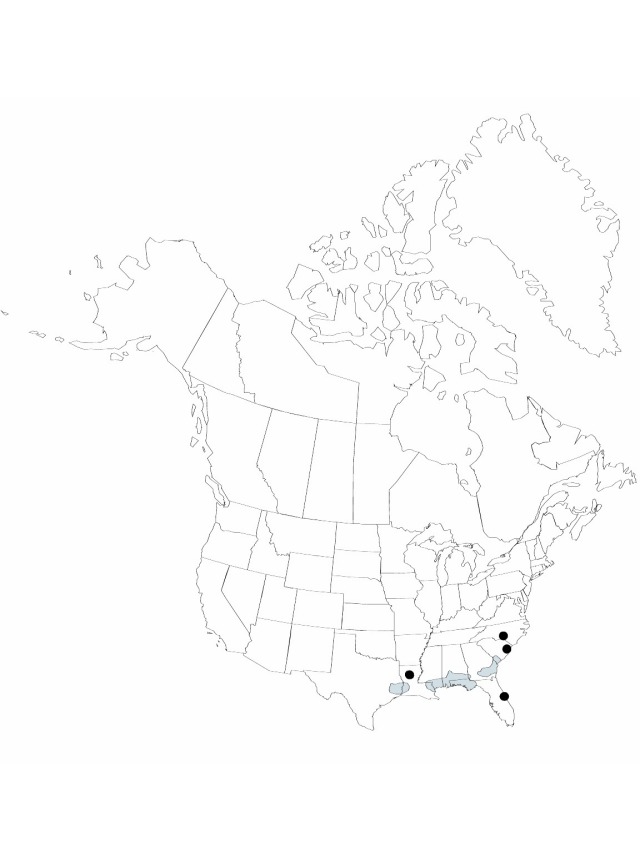Herbs, perennial, cespitose, 20–90(–100) cm. Stems compact. Leaves in narrow fans, 10–60 cm; sheaths smooth to papillate, base maroon; blade deep green with red or strong maroon tints, linear-tapering, flat, (2–)4–10 mm wide, smooth or papillate, margins smooth or minutely scabrous, smooth, or papillate. Inflorescences: scape sheaths much exceeded by leaves; scapes linear, distally oval to ancipital 2-edged, 1.5–3 mm wide, 2–several-ribbed, ribs papillate or minutely scabrous; spikes ellipsoid to ovoid or cylindric, (10–)15–30 mm, apex blunt to acute; fertile bracts 5–7 mm, margins entire, apex slightly keeled, convex. Flowers: lateral sepals included, reddish brown, curved, 5–7 mm, keel firm, ciliate; petals unfolding in morning, blade obtriangular, 3–4 mm; staminodes bearded. Seeds mealy, cylindro-fusiform, 0.6–0.8 mm, lined longitudinally with papillae, less distinctly cross-lined. 2n = 18.
Distribution

Ala., Fla., Ga., La., Miss., N.C., S.C., Tex.
Discussion
Xyris stricta forms a complex with X. ambigua and possibly arose as an independently breeding hybrid of X. ambigua and X. laxifolia within whose ranges it grows. I have labored since 1966 to determine its taxonomic status and at first believed it to be an extreme of X. ambigua with farinous seeds and smaller petals; then later I determined it to be a distinct species (X. obscura Kral, nom. nud.). Since then I have continued to make field observations and collections of the plant and have arrived at a different conclusion, allowing a more accurate and consistent taxonomy. On the one hand, the plant recently described as X. louisianica ranges to drier habitat than is usual for X. stricta and there commonly mingles with X. ambigua. But in character the plant overlaps most strongly with X. stricta, certainly in habit, pigmentation, leaf shape, bract and sepal character, corolla, and seed. The morphometrics are an indication that these plants have evolved in the Gulf Coastal Plain from X. stricta and are backcrossing with it.
Varieties 2 (2 in the flora).
Selected References
None.
Lower Taxa
Key
| 1 | Plants 50–90(–104) cm high; leaves 20–60 cm; blade 3–8 mm wide, edges smooth to ciliolate or papillate; scapes distally sharply 2-ribbed, these making edges, but with no or few additional low ribs; ribs smooth, scabrous, or cilioltate; spikes lance-cylindric, or cylindric, 2–3 cm; fertile bracts 6–7 mm; sepals averaging 5–6.5 mm | Xyris stricta var. stricta |
| 1 | Plants mostly 40–80 cm high; leaves 20–40 cm; blade (2–)2.5–3(–4) mm wide, edges scabrous or scabro-ciliolate; scapes distally strongly 2-ribbed, these making edges, but with several additional ribs between; all ribs minutely scabrous or papillate; spikes narrowly ovoid, lanceoloid, or ellipsoid, under 2 cm; fertile bracts 5–6.5 mm; sepals averaging 5–6 mm | Xyris stricta var. obscura |